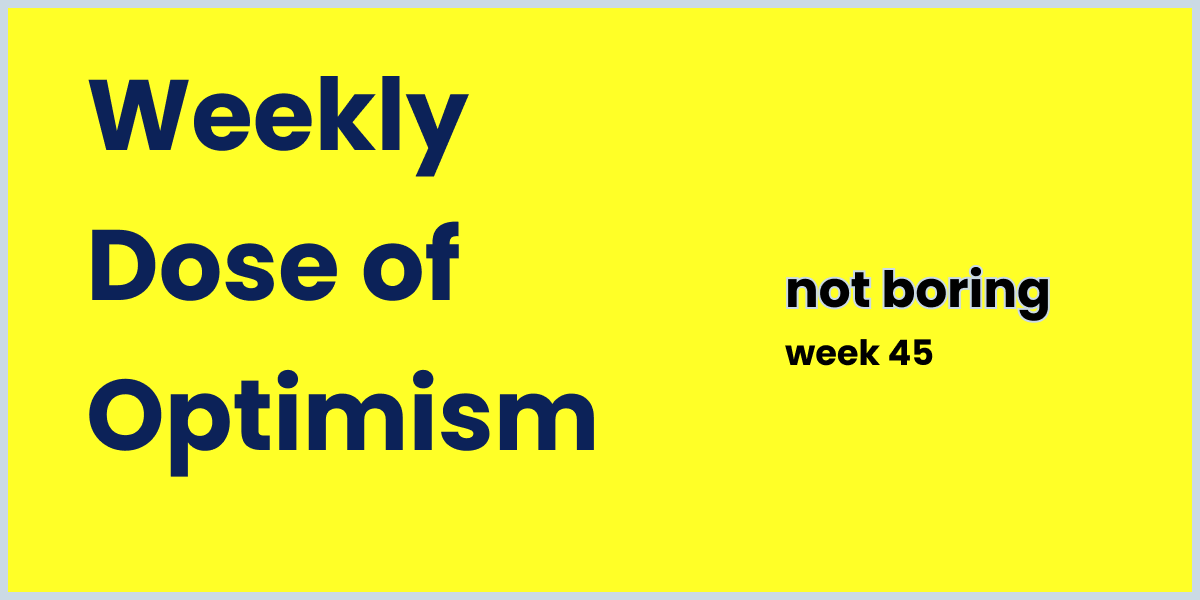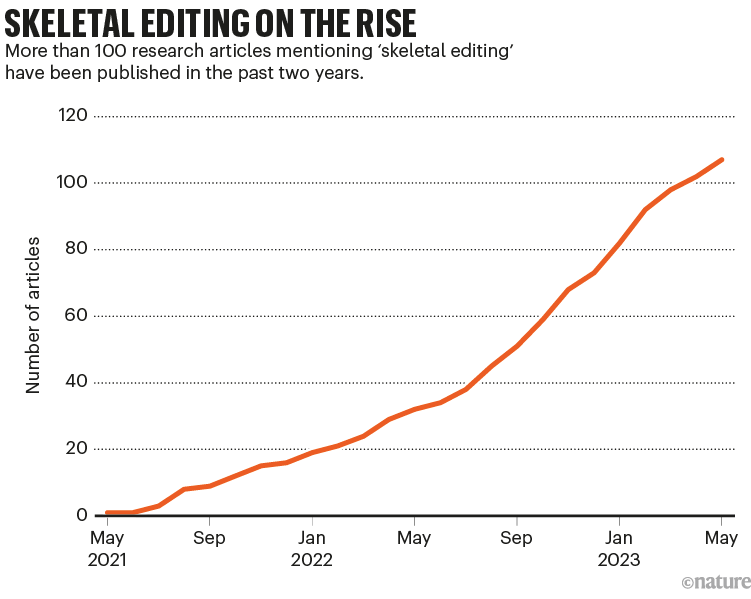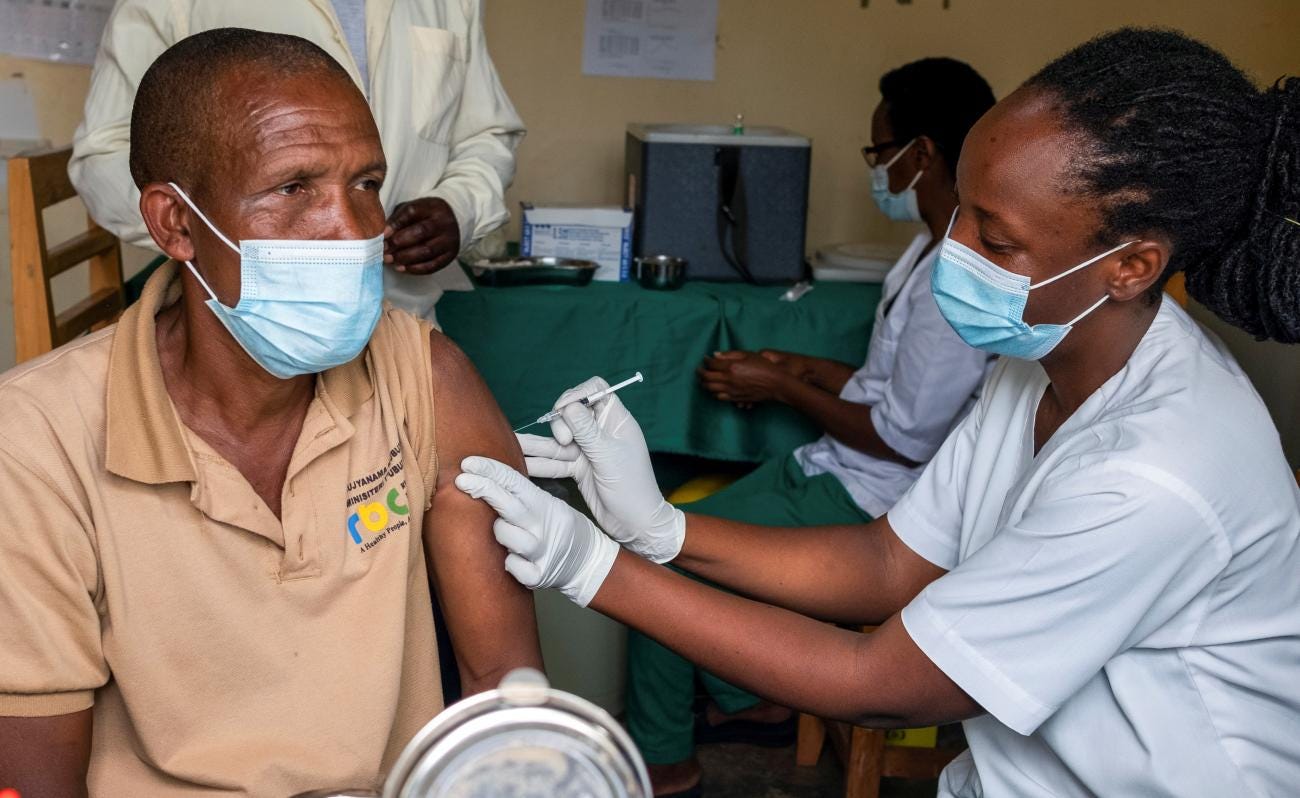

Weekly Dose of Optimism #45
source link: https://www.notboring.co/p/weekly-dose-of-optimism-45
Go to the source link to view the article. You can view the picture content, updated content and better typesetting reading experience. If the link is broken, please click the button below to view the snapshot at that time.

Weekly Dose of Optimism #45
Ketamine, Skeletal Editing, Dementia, Rwanda, AI Safety statement, Ezra
Hi friends 👋,
Happy Friday and welcome back to our 45th Weekly Dose of Optimism. Last week was the Obama edition, so it’s only fair that this week we’re making Optimism Great Again!
Anyway…
Let’s get to it.
The Weekly Dose is brought to you by... Fount
Fount is the personalized health and performance program used by high-level operators, execs, and people who want to get the most out of themselves. If you’re a longtime Not Boring reader you’ll know that Packy’s been using Fount for over a year to get his energy back, get in better shape, and improve his overall health metrics. Without Fount, Packy wouldn’t have clocked a 1:24:34 half-marathon earlier this month…
Fount recently launched a bunch of new products and offerings aimed at the specific needs of its customers.
Fount Pro: Fount’s flagship product designed to help you look, feel, and perform better…now with new pricing (~50% lower) that makes the program even more accessible. It’s also now open to people globally for the first time.
Fount Exec: the only precision performance program designed to strengthen the mind, body and leadership skills of founders and executives. If you’re a busy founder or exec, you have to check this out. You can probably even expense it…
FlyKitt: FlyKitt is the first all-in-one system that’s guaranteed to prevent jet lag. Long flight coming up? This system has saved thousands of trips from being ruined by jet lag. Packy uses them specifically whenever he travels internationally. You can use code notboring15 for 15% off the FlyKitt.
If you’re interested in either Fount Pro or Exec, book a free consult with one of their world-class performance advisors at the link. Plus, if you mention Not Boring during the consult, they’ll give you $500 off your first month.
(1) Ketamine versus ECT for Nonpsychotic Treatment-Resistant Major Depression
From The New England Journal of Medicine
A new study suggests that, for some patients, the anesthetic ketamine is a promising alternative to electroconvulsive therapy, or ECT, currently one of the quickest and most effective therapies for patients with difficult-to-treat depression. The study is the largest head-to-head comparison of the two treatments. (Quote from the NYT)
A new head-to-head study in the The New England Journal of Medicine, found that ketamine was at least as effective as ECT in patients with treatment-resistant depression. Electroconvulsive therapy, or ECT, has long-established efficacy but it comes with some unwanted side effects (potential memory loss, muscle pain and weakness) and a tough stigma (think getting strapped to a table with a leather shock helmet) that makes it unwanted by some patients. Ketamine, on the other hand, does not come with the same side effects, but does come with a stigma of its own — that it’s a horse-tranquilizing party-drug.
Overall, though, it’s about giving people safe options in treating the otherwise horrible affliction that is treatment-resistant depression. ECT is one option, ketamine another, and there is new and exciting research coming out on a whole host of other psychedelic-based treatments that are showing promise.
(2) ‘Almost magical’: chemists can now move single atoms in and out of a molecule’s core
Mark Peplow for Nature
Now head of a team at the University of Chicago in Illinois, Levin is among a cadre of chemists pioneering these techniques, aiming to more efficiently forge new drugs, polymers and biological molecules such as peptides. In the past two years, more than 100 papers on the technique — known as skeletal editing — have been published, demonstrating its potential.
Sometimes we cover stories of individual breakthrough discoveries or wave-making studies, but those stories are usually the results of graphs like the one above. A flush of excitement, research, and resources on a specific topic leads to a major innovation.
According to this Nature article, we may be on the cusp of one such breakthrough in “skeletal editing.” Skeletal editing is the process by which a molecule is edited by deleting, adding, or swapping single atoms in its core. It has the potential to transform how organic chemists design molecules, and may lead to, among other things, speedy drug discovery.
With the momentum we’re seeing in AI, skeletal editing, immunotherapy, gene-editing, and early detection (will get to this later) — it just seems like we’re on the cusp of developing treatments and cures to some of the diseases that have long ailed us.
(3) Causal evidence that herpes zoster vaccination prevents a proportion of dementia cases
From Markus Eyting, Min Xie, Simon Heß, Simon He, Pascal Geldsetzer
We then show that receiving the herpes zoster vaccine reduced the probability of a new dementia diagnosis over a follow-up period of seven years by 3.5 percentage points (95% CI: 0.6 – 7.1, p=0.019), corresponding to a 19.9% relative reduction in the occurrence of dementia. Besides preventing shingles and dementia, the herpes zoster vaccine had no effects on any other common causes of morbidity and mortality. In exploratory analyses, we find that the protective effects from the vaccine for dementia are far stronger among women than men.
Take, for example, dementia and Alzheimer’s — seems like these terrible diseases are close to having effective treatments, if not cures, over the coming years. In a new study, it was shown that recipients of the herpes zoster vaccine (Zostavax) were considerably less likely to develop dementia later in life.
The study compared adults just a week apart in age but differing in vaccine eligibility, and found that receiving the vaccine decreased the likelihood of a new dementia diagnosis by 3.5 percentage points over a seven-year period, which was a 19.9% relative reduction. The study concluded that the varicella zoster virus may play a significant role in the development of dementia, especially among women, and further randomized trials are needed.
While this is not, of course, a cure for dementia (or even a treatment), it gives researches a better understanding of what causes dementia in the first place. And from this understanding, they can develop new treatments, therapeutics, and vaccines to potentially prevent or cure the disease down the line.
(4) Rwanda’s Health-Care Success Holds Lessons for Others
Cameron J. Sabet, Alessandro Hammond, Simar S. Bajaj, Belson Rugwizangoga for Think Global
Owing to these efforts, in 2020, more than 90 percent of Rwanda’s people had some kind of health insurance. This stands out relative to other low-income countries, where on average 31 percent of people have health insurance. Experts say that coverage has helped contribute to a massive rise in Rwanda’s life expectancy, from 49.7 years in 2001 to 69.6 in 2022, and empowered the country to tackle prominent causes of mortality. Indeed, Rwanda is the only sub-Saharan low-income country to meet the UN Millennium Development Goals of reducing maternal mortality and reversing the spread of malaria, tuberculosis, and AIDS.
A few weeks ago I got a call from my sister and she informed me she was in Rwanda. “Rwanda?” I anxiously asked. From the tone of my voice, she could tell that I was scared. And she knew why I was scared. Rwanda, at least in the West, is associated with genocide. You don’t want to get a call from your sister and have the first words come out of her mouth immediately conjure images of genocide.
She quickly assuaged my fears. Rwanda, she informed me, was now like the “Singapore of Africa.” Since 1994, under the leadership of President Paul Kagame, the country has experienced rapid economic development and stabilization. It’s where my sister goes on the continent to get banking business done quickly. Its tourism economy has rebounded. And, as the story above notes, it’s developed somewhat of a playbook for developing countries in increasing healthcare availability and lengthening lifespans.
The government, to be certain, does face criticism. But overall, the country is starting to become known more forward thinking policies on healthcare, technology, and gender equality and less known for its darkest moment.
Mitigating the risk of extinction from AI should be a global priority alongside other societal-scale risks such as pandemics and nuclear war.
This statement isn’t the “everything is going to be OK, don’t even worry about it” flavor of optimism. But it is an official acknowledgement, from some of the most powerful figures and organizations in AI (OpenAI, Google, Anthropic, Geoffrey Hinton, etc.) that AI is such a powerful tool/trend/technology that it deserves societal-scale attention, and yes ultimately, societal-scale regulation.
There’s two pessimistic ways to view this statement:
Holy shit…AI is as dangerous as pandemics and nuclear war.
This is just AI industry leaders pulling up the ladder by all-but begging for regulation.
I think both are partially true. Yes, the worst-case AI outcome is that civilization goes bye-bye. And yes, OpenAI, Google, and Anthropic all benefit from stricter AI regulation.
But I also think there are two ways to view this statement more optimistically.
I’m a sucker for societal-scale collaboration. Manhattan Project. Smallpox Eradication. The Marshall Plan. Space Race. All the results of some looming fear that catalyzed societal-scale responses, which engender both direct and indirect positive outcomes.
We have ultra-powerful AI. This wasn’t true even just a few years ago. Now it is. It’s so powerful that it may destroy civilization. It’s also so powerful that is may fix every problem that civilization has ever encountered.
However you view it, it’s an important story that we think merits some further thinking over the weekend.
(Bonus) Ezra: The Quest to Kill Cancer
Packy McCormick for Not Boring by Packy McCormick (lol)
As cancer treatments improve simultaneously, I hope the combination of earlier detection and better treatments combines to make a cancer diagnosis as benign as cataracts. Hopefully, one day in our lifetimes, cancer will join tuberculosis, pneumonia, and polio in the growing list of once-fatal diseases that we’ve managed to overcome. That day can’t come fast enough.
Yesterday Packy published a Sponsored Deep Dive on Ezra. Ezra is on a mission to detect cancer early for everyone in the world. The company offers full-body MRI scans in order to catch cancer earlier to increase the odds of beating it.
As part of the piece, Ezra also announced its biggest leap to date: the 30-minute Full Body Flash scan, which cuts both the time and cost of getting an MRI to screen cancer in half. Ezra Flash, the AI powering the new scan, has recently received FDA clearance, enabling Ezra to launch the world’s first 30-minute Full Body MRI scan.
As part of his research, he got himself a scan…and revealed that he hadn’t been to a doctor’s office since 2009. Packy’s personal experience is entertaining, but we’re hoping this analysis of the cancer screening industry brings more attention from other operators, investors, partners, and clients to an important (and potentially life saving) topic.
Not to bury the lede, Packy was cancer free. If you want to get yourself checked out, book your Ezra scan and use the code PACKY150 to get $150 off.
That’s all for this week. We’ll be back in your inbox on Monday. Enjoy the long weekend.
Thanks for reading,
Recommend
About Joyk
Aggregate valuable and interesting links.
Joyk means Joy of geeK





